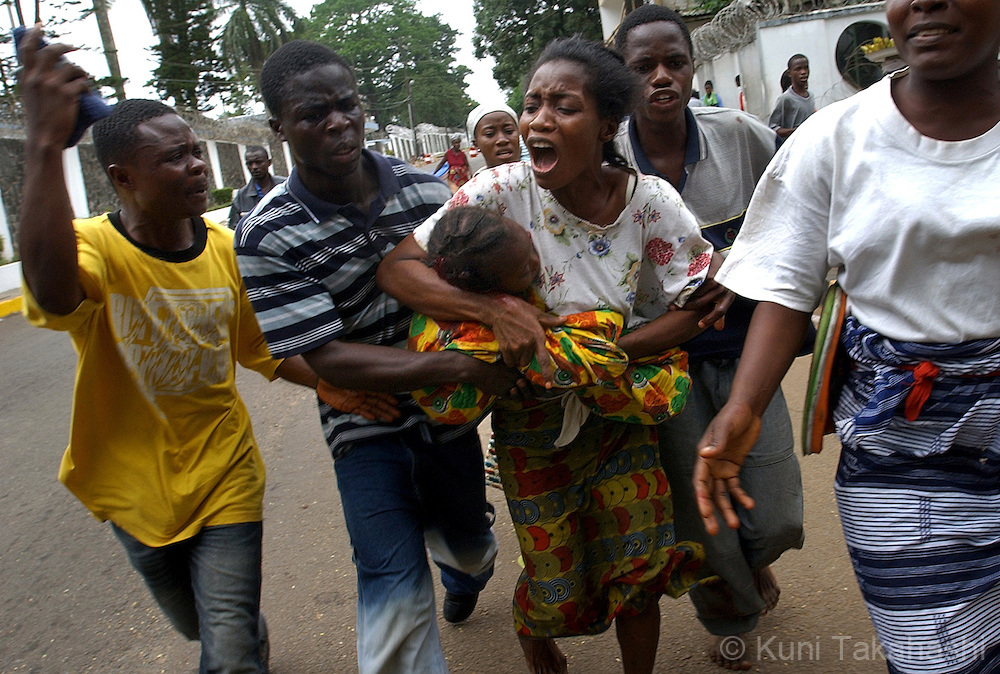When, on a bright sunny day in April of 1979, gunshots were heard on the streets of Monrovia, nobody could have foretold that it was the beginning of a series of events that was to plunge the country into one of the most horrific wars that humankind had ever witnessed.
It was April 14, 1979, the beginning of what was later dubbed “The Rice Riot”; the step by step destruction and dismantling of Liberia’s infrastructures had begun. Soldiers and civilians alike were seen in the streets toting looted freezers and other electronic appliances on their heads. Up till that fateful day, most Liberians had never heard a gun fired except at the movies.
The jubilation that greeted the sad events clearly demonstrated the ignorance of the population. Having slept late because of the late drinking and escapades of the night before, it took me some time to make sense of the sight I beheld when I stepped out of my apartment at about midday. Scattered around the courtyard of the huge building where I was renting an apartment were assortments of new building materials, electronics, provisions etc., belonging to my neighbors. When one of my neighbors, Mrs. Swen, explained that Mr. Baccus Matthews and his colleagues were leading a riot to demand the reduction of the price of a bag of rice, I had a sense of foreboding. In answer to Mrs. Swen’s question as to whether I would not go and get my share of the loot, I could only smile and wave, indicating my lack of interest.
The overwhelming illiteracy coupled with the grinding poverty prevented the majority of the population from comprehending that such vandalism and destruction could not possibly herald anything but hardship and adversity.
Two days short of a year later, April 12, 1980, the bloody overthrow of President Tolbert’s government was the beginning of a roller coaster ride – a fast a furious decade that was the reign of the Samuel Doe government. Then Sergeant Samuel Kanyan Doe led the fateful coup which overthrew the government of the country’s president, Rev. Dr. William R. Tolbert. The execution of 13 officials of the previous government and the president was one of the events of the coup that was to usher in the civil war ten years later.
One of my experiences at the beginning of the war in 1980 that is worthy of note was my last trip from Booker Washington Institute (BWI), Kakata where I had resided and taught for the previous 10 years. Because of the tension at the centre of the town occasioned by the overly aggressive behavior of the Armed Forces of Liberia (AFL), I along with my friends, Messer’s. Charles Mulbah and Huzani Sesay, decided to travel to Monrovia with the expectation that whatever was happening would be quelled by the end of the week and we would return to work. It was seventeen years later before I returned to Kakata. We wouldn’t know until much later that the town, by then, had already been surrounded by the rebels; my Honda Accord was the last civilian car out of the once peaceful Kakata before all hell broke loose.
When we arrived at the 15th gate, the jittery soldiers were a sight to behold; you could sense the fright in them as they shot at anything and everything. Earlier, we had been warned that any name which sounded Gio or Mandingo could earn a bullet or four; we had therefore decided to hide the ID card of Huzani Sesay, whose Vai name was prevalent among the Mandingos. The soldiers insisted that he should produce his ID despite our initial explanation that his name was Samuel Blamoh and that the had lost his ID in our haste to leave town. By then, the tension was so palpable, you could cut it with a knife. I was about to start saying my prayers when one of us had the presence of mind to mention the name Kudar Turray. Mr. Turray, who happened to be the principal of BWI and who also happened to be an uncle of the the head of state, Sergeant Doe, was so widely revered by the Krahn ethnic people that he was practically deified. If not for the mention of that magic name that ended up getting us our freedom, I probably wouldn’t be here today. After all, we passed several bloated corpses as we drove away from Kakata, people who met their untimely deaths for reasons as mundane as looking too sophisticated or too educated.
April 6, 1996 introduced one of the most deadly aspects of the Liberian war. The fighting was very costly in terms of materials and human losses. Mr. Charles Ghankay Taylor and his troops, which mostly comprised of child soldiers, made moves to arrest rebel leader, Roosevelt Johnson, on the grounds of murder. The fighting, which included many unsuccessful attempts of Taylor’s troops to capture the barracks where Johnson was holed up in, lasted about three months.
It was during the course of these three months that my beautiful daughter was delivered in my apartment in the early hours of May 20, 1996 to a waiting medical team led by my mother-in-law, who is a registered nurse, since the raging war around us prevented any attempts to go to the hospital. Prior to the delivery, my mother-in-law had invited a midwife, who was a colleague of hers, to move in with us since there was no surety that she would be able to come to us when needed even though her home was but a stone-throw away. Also available for backup was Dr. Taylor Neal, a renowned Liberian doctor who had been displaced because of the war and was residing with his brother.
During this bloody civil war, thousands of people died and many more fled into exile by whatever means possible. In order to give you an idea of the terror and despair of Liberians during this war, here’s the story of the Bulk Challenge. This story has been told in many forms but here’s the fact: contrary to whatever grandeur that has been added to the event, it was actually the exploits of a rickety Nigerian fishing boat that left the Liberian port, overloaded and undersupplied. Even though it looked precarious while loading, many people preferred to risk the perilous journey than to stay behind and watch Liberia burn.
Three of the deadliest events of the 14 year civil war that wracked this country happened during the month of April. I think this month is so symbolic in Liberia that it took so many years after 1996 before people began to shake away the feeling of deja vu that permeates the atmosphere whenever the month of April is approaching.
Authored by Adonis Raji
Featured photo by Kuni Takahashi

